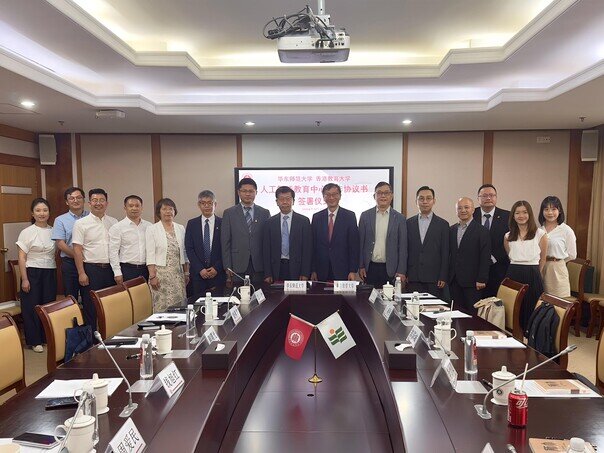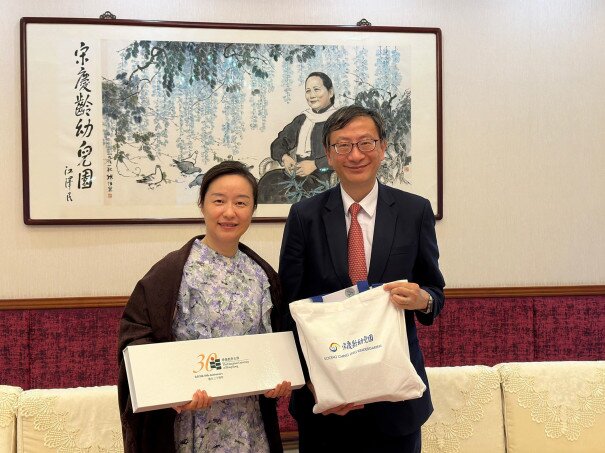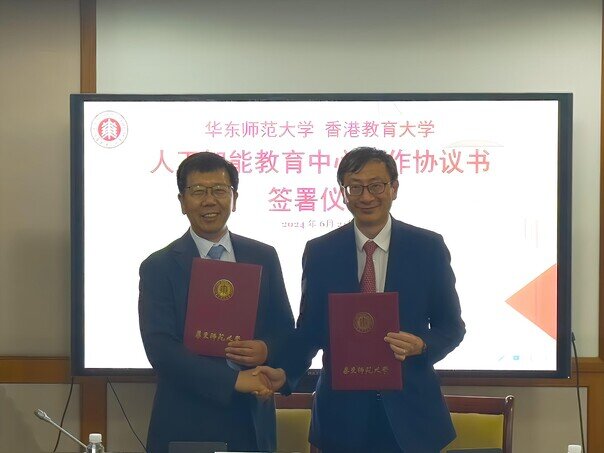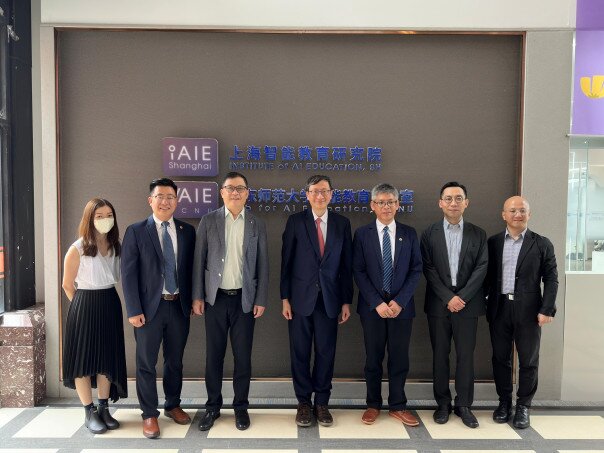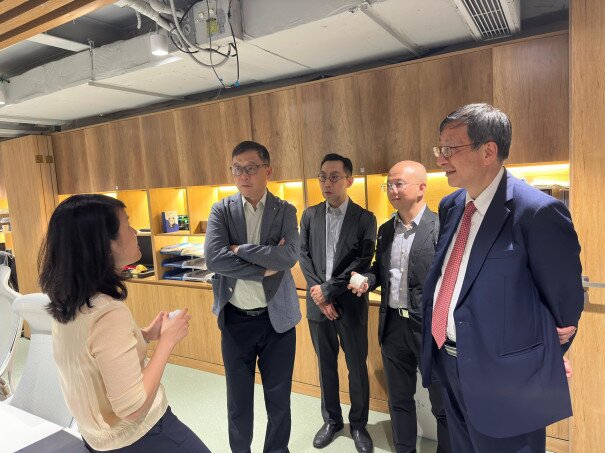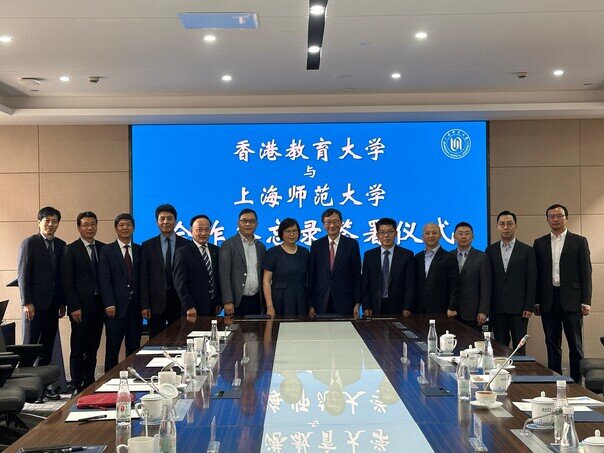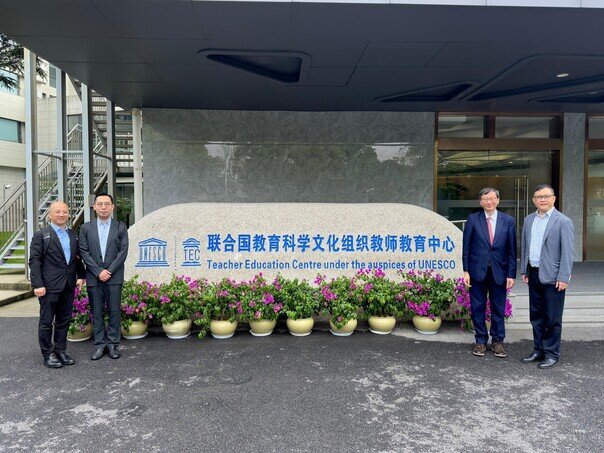President of The Education University of Hong Kong (EdUHK) Professor John Lee Chi-Kin led a delegation to Shanghai from 21 to 22 June, and reached collaboration with two universities in the areas of artificial intelligence education and STEM education.
Members of the EdUHK delegation included: Professor Xu Guandong, Director of Centre for Learning, Teaching and Technology (LTTC) and Dr Gary Cheng Kwok-shing, Executive Co-Director of LTTC and Mr Donny Siu Koon-ming, Director of Global Affairs, among others.
On 21 June, the EdUHK delegation visited East China Normal University (ECNU), where they were warmly received by President Qian Xuhong, Deputy Secretary of the CPC East China Normal University Committee Meng Zhongjie, Director of International Cooperation and Exchange Division Kuai Shuguang, Dean of the School of Computer Science and Technology and Shanghai Institute of AI for Education Zhou Aimin, Vice Deans Jiang Bo and Zhang Kai, Deputy Director of Office of Science and Technology Rao Shengping, Deputy Director of the Academy of Humanities and Social Sciences Wu Wenyu, Director of Office of Hong Kong, Macao and Taiwan Affairs Subin Wang. The EdUHK delegation visited the Shanghai Institute of AI Education and the Children’s Brain Imaging Centre at ECNU.
EdUHK and ECNU jointly established the Centre on Artificial Intelligence in Education last year. During the meeting, the progress of three joint research projects was reported.
The first project is the construction of a multi-modal handwriting analysis platform for children. This platform analyses children’s writing motions (such as posture, eye movements and pen pressure), as well as the morphology and characteristics of their handwriting, to assess their personality and cognitive development. This allows for personalised guidance to promote the development of children’s writing skills and learning. Currently, the team has completed data collection and analysis and is optimising the platform.
The second project is the promotion of personalised learning in primary mathematics through collaboration between teachers and chatbots. The joint research team has collected a total of 1,200 minutes of video data containing one-on-one online math tutoring sessions between fifth-grade students and teachers. The team has now converted all the dialogue in the video data into text, which will be coded and analysed in detail to identify effective one-on-one online tutoring models. These models will then be integrated into large language models and chatbots to improve the effectiveness of students’ online math learning.
The third project is the development of an AI Chinese composition tutoring system for Hong Kong students. The joint research team has analysed the writing requirements and assessment criteria in the Chinese Curriculum Standards for Compulsory Education issued by Ministry of Education of the PRC and those for primary and secondary schools by the Education Bureau in Hong Kong. While both sets of requirements and criteria are largely consistent, some language expressions needed to be adjusted due to differences in social environment and geographic factors. The team is currently collecting and analysing more writing samples from Hong Kong students to improve the accuracy of the system.
To further enhance research and academic standards, EdUHK and ECNU further signed an MoU for the Centre, launching more joint research projects in AI education and launching a doctoral student exchange programme.
On the morning of 22 June, the EdUHK delegation visited Shanghai Normal University (SHNU) and was received by President Yuan Wen, Deputy Secretary of the Party Committee Liu Xiaomin, Vice President Jiang Mingjun, Director of the Office of the University Shi Jiahua, Dean of Education College Huang Haitao, Director of the Information Office Gu Yiming, and former Director of the Hong Kong, Macao and Taiwan Affairs Office Wu Cheng. The EdUHK delegation visited the Teacher Education Centre under the auspices of UNCESCO established by the Shanghai Municipal Government and operated by SHNU, as well as the museum and history museum of SHNU.
During the meeting, EdUHK and SHNU signed an MoU on STEM education, further strengthening exchange among students, launching research collaborations among teachers in STEM and interdisciplinary fields, and co-organising STEM seminars for Shanghai and Hong Kong universities. The two universities will also explore collaborations in activities and programmes related to UNESCO and lifelong learning.
In the afternoon, the EdUHK delegation visited the Soong Ching Ling Kindergarten (Hongmei Campus), a Chinese-founded international school established under the leadership of the China Welfare Institute founded by Madame Soong Ching Ling in 1938. Principal Zhu Sujing and other school leaders introduced the rich history of the school and its educational philosophy of promoting multiculturalism and the “Circle of Love”. The delegation also toured the multicultural division, international division and various facilities of the school.
In the evening, Professor John Lee Chi-Kin attended a dinner in Shanghai hosted by the EdUHK Mainland Alumni Association, where he gathered with over 150 EdUHK alumni from the mainland.
Summarising the visit, he said: “By forging deeper exchanges and strengthening partnerships with various institutions in Shanghai, EdUHK aspires to further propel the advancement of education across Hong Kong and Shanghai. Harnessing our respective strengths, we aim to cultivate talent in the realms of educational professions, research and New Quality Productive Forces. In doing so, we will create greater avenues for our alumni to thrive, while contributing to the development of Hong Kong as well as the country.”


